We are struggling.
A couple of weeks ago we, Rodd and Ben, were participants and members of the organizing team for UnPlug'd, a Canadian Education Summit. As the website says:
UnPlug’d brings together Canadian educational change agents to share peer-reviewed success stories; to deepen relationships among participants; to publish the collective vision of the group. Grassroots educators will share their first-hand experiences, collectively considering modern approaches to learning. The summit will culminate with the release a publication that communicates a vision for the future of K-12 education in Canada.
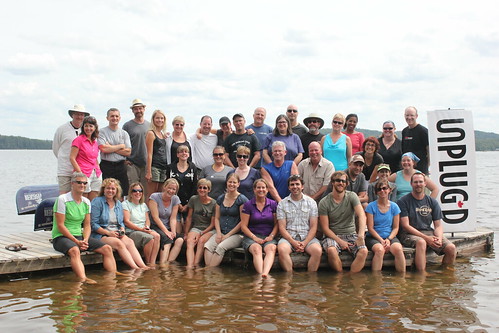
We’re struggling to find the words to explain what Unplug'd was, but we do know what it wasn't. It wasn't an accident; it wasn’t a conference; and it wasn't perfect.
But maybe:
Perfect isn't real.
Perfect is fake.
Real isn't perfect.
Real is beautiful.
In trying to understand what happened at unplugd11, we've developed a list of perfection targets that we 'missed'.
Perfection Myth #1: Everyone was represented.
This didn't happen. We didn't have every ethnicity, region, and cultural group represented. For goodness sakes there were only 37 people there!
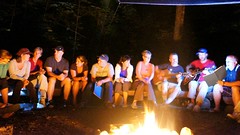 Ben: One moment that I remember is the campfire on the first night. I looked around the fire. The warm glow was illuminating many faces that I'd only known as avatars. We were singing. Yes singing. Guitars were being played by Stephen and Bryan. In that moment I had the overwhelming sensation of loose ties being tightened. In that moment, I had a sense of connection and belonging with this group. This imperfection may have allowed the intimacy and warmth to develop among those that did attend.
Ben: One moment that I remember is the campfire on the first night. I looked around the fire. The warm glow was illuminating many faces that I'd only known as avatars. We were singing. Yes singing. Guitars were being played by Stephen and Bryan. In that moment I had the overwhelming sensation of loose ties being tightened. In that moment, I had a sense of connection and belonging with this group. This imperfection may have allowed the intimacy and warmth to develop among those that did attend.
Perfection Myth #2: Perfect Logistics = Perfect Learning
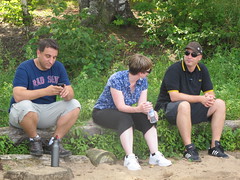 Rodd: Our initial plan called for transportation to deliver my group to Norther Edge Algonquin by 3 p.m. We arrived just after 5 p.m. What did we do during the few hours we waited? We talked. And I stressed. Maybe this was the way things were meant to be, because after reassurances from my fellow stranded campmates, I joined them in ‘slowing down’, doing a slow dissolve into a different space and a different pace. Our late arrival meant that our initial large group and small group meetings would be taking place later in the afternoon.. through the dinner hour. And knowing how comfortable that first meeting came to be, I wouldn’t have had it any other way. This bit of imperfection led us to a more natural setting for the sharing of personal stories.
Rodd: Our initial plan called for transportation to deliver my group to Norther Edge Algonquin by 3 p.m. We arrived just after 5 p.m. What did we do during the few hours we waited? We talked. And I stressed. Maybe this was the way things were meant to be, because after reassurances from my fellow stranded campmates, I joined them in ‘slowing down’, doing a slow dissolve into a different space and a different pace. Our late arrival meant that our initial large group and small group meetings would be taking place later in the afternoon.. through the dinner hour. And knowing how comfortable that first meeting came to be, I wouldn’t have had it any other way. This bit of imperfection led us to a more natural setting for the sharing of personal stories.

Perfection Myth #3: Professional conversations are best held in spotless rooms with round tables, white linens and climate controlled conditions.

This also didn't happen. We sat on floors, rocks, Muskoka chairs, and benches while getting mosquito bites. We wrote on our laps, had conversations while doing dishes, and paddled in silence as the sun set. At times we were too warm. At times we were too cold. At times, we were downright smelly.
 Ben: On our bike ride to the site from the train station I settled into a comfortable pace with Vince. We had known each other as acquaintances from various other face to face meetings. However, over the bike ride there were unique moments that we shared as we peddled. We shared about our upbringings and why we are in education. We shared at a deeper level than I was used to in traditional conferences. As we peddled Vince shared that, "having distinct experiences, like riding bikes to get to the location, are going to help me remember what I talked about during each part of this weekend". This imperfection led to memorable and unique conversations around mutually shared experiences.
Ben: On our bike ride to the site from the train station I settled into a comfortable pace with Vince. We had known each other as acquaintances from various other face to face meetings. However, over the bike ride there were unique moments that we shared as we peddled. We shared about our upbringings and why we are in education. We shared at a deeper level than I was used to in traditional conferences. As we peddled Vince shared that, "having distinct experiences, like riding bikes to get to the location, are going to help me remember what I talked about during each part of this weekend". This imperfection led to memorable and unique conversations around mutually shared experiences.
Perfection Myth #4: Getting feedback on our work is easy for professional learners.
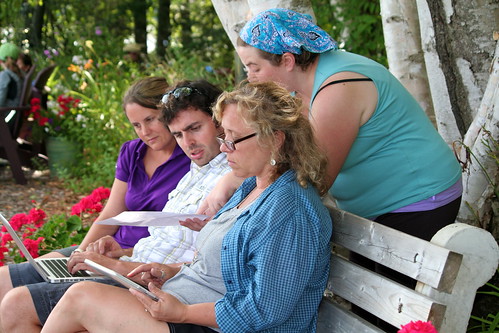 Rodd: I remember listening to feedback from my colleagues meant to improve upon my writing, and thinking “What… It’s not perfect just the way it is? I’ve already revised it numerous times. I write online all the time!” Giving feedback in handwritten notes, and providing encouragement and tweaks was fine when I was in ‘teacher’ mode, but as the recipient of similar advice, initially I bristled. But, the advice I received was given constructively, and in a generous spirit, and when I was able to disconnect myself from my piece, I was able to see my work with fresh eyes. The advice, including a suggested title, made my writing better. Not perfect, but better. Although the many ideas shared in ‘Why Blank Matters” are sure to resonate with educators, the writing that communicates the ideas, is far from perfect. But realizing that the search for perfection might forever delay the completion of any piece of writing, maybe the 40 pieces in our document are just perfect enough. The book models for readers that ideas are worth sharing, and debating, even if only polished to a state of mild imperfection.
Rodd: I remember listening to feedback from my colleagues meant to improve upon my writing, and thinking “What… It’s not perfect just the way it is? I’ve already revised it numerous times. I write online all the time!” Giving feedback in handwritten notes, and providing encouragement and tweaks was fine when I was in ‘teacher’ mode, but as the recipient of similar advice, initially I bristled. But, the advice I received was given constructively, and in a generous spirit, and when I was able to disconnect myself from my piece, I was able to see my work with fresh eyes. The advice, including a suggested title, made my writing better. Not perfect, but better. Although the many ideas shared in ‘Why Blank Matters” are sure to resonate with educators, the writing that communicates the ideas, is far from perfect. But realizing that the search for perfection might forever delay the completion of any piece of writing, maybe the 40 pieces in our document are just perfect enough. The book models for readers that ideas are worth sharing, and debating, even if only polished to a state of mild imperfection.
Perfection Myth #5: It is best to share ideas in slide decks that give clear answers.

We intentionally ignored this usual conference expectation. Each participant brought their own ideas, vision, and passion. Each person brought their 'story' to share over dinner. These ideas were challenged, reconsidered, and revised as the shared experiences of the summit unfolded.
 The final formal moments of UnPlug’d were experienced as all the participants gathered in the Butterfly room, each given a brief moment to share a closing thought with the whole group. One at a time, we attempted to distill the thoughts and ideas that had been filtered throughout our weekend of shared experiences. Encouragement was offered, insights were shared, and profound statements were made.
The final formal moments of UnPlug’d were experienced as all the participants gathered in the Butterfly room, each given a brief moment to share a closing thought with the whole group. One at a time, we attempted to distill the thoughts and ideas that had been filtered throughout our weekend of shared experiences. Encouragement was offered, insights were shared, and profound statements were made.
Ben: I don’t want to speak for others, however, when my turn came I was overwhelmed with emotion and chose to share a key lesson that I had learned about courage. As my voice cracked, I let down my guard and shared what I had learned about courage from my interactions that weekend. I finished by sharing how this lesson about courage would guide me in the upcoming school year. This imperfect sharing of ideas allowed us to 'get real' about the situation that we are trying to improve.
Perfection Myth #6: Each planned activity achieved its intended purpose.
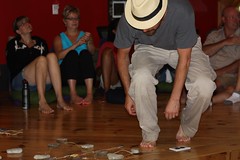
One of the symbols of UnPlug’d was a large physical mindmap that represented the participants (stones), their ideas (wooden disks), and the connections between them (ribbon and twine). On site, Kim Crawford reflected “Just as we gather around a campfire, the ideas and people in the centre of our meeting room, provided the flame to foster our connectedness.” As the weekend progressed, Tom Fullerton further explained “The rocks were people and the wooden disks our ideas. We used cord to show connections. I described the rocks to my working group as not being as solid as they might appear. Each of us is shaped and rubbed smooth by contact with other rocks as we are pushed together by waves and wind, the conversations and experiences we share.”
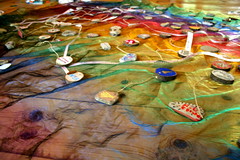 Some participants looked to the map as an opportunity to let their artistic sensibilities shine. Others created personal icons as more of an afterthought. Limited access was available to the evolving map because the planning team opted to host ‘check-in’ meetings in the same central meeting space. In doing so, we unintentionally blocked participants from fully engaging with this piece.
Some participants looked to the map as an opportunity to let their artistic sensibilities shine. Others created personal icons as more of an afterthought. Limited access was available to the evolving map because the planning team opted to host ‘check-in’ meetings in the same central meeting space. In doing so, we unintentionally blocked participants from fully engaging with this piece.
Although the mindmap never fully realized its visual potential as a representation of the many connections among participants and their ideas, the artistic and symbolic elements were meaningful to many participants. Some withdrew artifacts from the collaborative piece as mementos of their experience. When members of the planning team stayed behind to finalize publication details, we were granted the honour of finding a home for the personalized artifacts that had been left behind by participants.
High Value Imperfection
Unplug'd had many imperfections. It wasn't perfect, it was real. Real conversations and struggles were shared. Real people maintained eye contact, were present in the moment, and expressed authentic empathy. Real people were heard and listened. Real people expressed how this experience has re-energized them for the challenge of a new school year. And real is beautiful... even if imperfect.


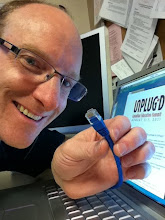


4 comments:
Ben and Rodd,
I know what you mean about struggle for the words – but you did it, and did it well.
Real is the perfect word for this, even if it is not perfect.
There were times during the two days that struggled with my role as participants vs. organizer. It made me very aware of the imperfections, the change of schedule and how the other participants were feeling. Maybe because of my own imperfection of wanting to control the situation (something I am working on) or maybe it was because we were so invested in this event, in so many ways, that my senses were heightened.
What I might add as another Myth: Content in PD comes first.
So many times we start with an agenda in mind. We do this because we need to teach it. Maybe because of due diligence, maybe because of time, maybe because we want or need to implement something, maybe even for safety or information or we need consistency in an organization. We might give 2-3 minutes for a quick “get to know you activity” and then we move directly to the information and content. Unplug’d demonstrated, in so many ways that you describe that when relationship building comes first and is planned authentically and ongoing, the content is not only more rich and deep but it is sustainable. The conversation continues, grows, and changes.
Zoe,
You're exactly right about the Myth that Content comes first in PD. I would suggest that the same is true for the learners in our classrooms.
When students feel connected to one another and to the teacher, they are much more apt to participate in meaningful ways. When they have a stake in the outcome, in can only amplify their engagement.
Even though we were mindful of creating a safe environment for connecting and sharing, I don't think any of us foresaw the level of commitment educators gave to the entire process. Just as we were invested as members of the planning team, delegates demonstrated their commitment by completing a number of intellectually and emotionally intense tasks... before, during and after the event!
This finding may not be documented in the literature, but based on this one case study, I'd suggest we're safe to consider modifying traditional practices to include relationship building as a key component.
Finally! Someone else who "gets" the magic of being at a camp setting while professional capacities are stretched and grown! I spent nine summers at Girl Scout Camp, and as you said, through the mosquitoes, the heat/cold, the discomfort, comes real progress, real thought, real insight! Deep, long-term friendships embellish a memorable 'thinktank period', and I am grateful for this enjoyable blog!!Thank you so much!
Just read this by Bryan Jackson. It reminds us of 'Why Learning Outside Matters' http://bryanjack.ca/2011/09/26/why-learning-outside-matters/
Post a Comment